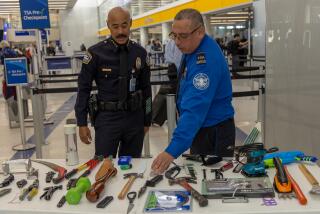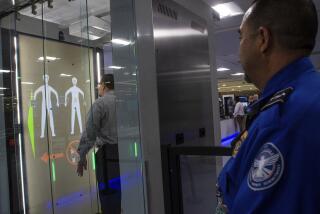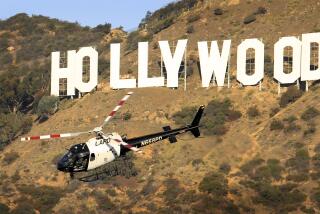Customs officials revise practices for detaining private airplanes
U.S. Customs and Border Protection officials said Friday they have tightened their practices for stopping and searching private aircraft in an effort to reduce law enforcement encounters with innocent pilots.
Deputy Assistant Commissioner Eddie Young, a top official with Customs’ Air and Marine Operations unit, said several changes have been put in place to better handle detentions of pilots whose flights are deemed suspicious by the agency’s radar tracking center in Riverside.
They include ongoing evaluations of the criteria for determining when aircraft should be detained, training for customs officials and more guidance for local law enforcement agencies called on to check on pilots and planes when they land.
Young said a significant number of pilots have complained about what they believe have been overly aggressive tactics used by local police when responding to tips from the agency.
“Preventive measures are being taken to be less intrusive with law-abiding pilots,” Young said. “We are educating local law enforcement in pockets around the country on what approaches to take.”
Customs officials noted that during the past 10 to 11 months, 25 flights were intercepted out of 474 that were monitored, resulting in seven arrests on criminal charges and a regulatory case that was referred to the Federal Aviation Administration. The 32% success rate, they said, is an improvement over the 18.3% rate of the previous 3 1/2 years.
The tracking operation, which is based at March Air Reserve Base, became controversial several months ago when the Aircraft Owners and Pilots Assn., a national organization, complained that some of its members had been improperly detained during flights in the United States.
The association has received more than 50 reports from private pilots who stated that federal and local law enforcement officers—sometimes more than a dozen--surrounded them with guns drawn, hold them for several hours and at times search their planes and even their hotel rooms. None of those pilots were arrested.
Earlier this month, customs’ new commissioner, R. Gil Kerlikowske, and Assistant Commissioner Randolph D. Alles, met with pilot association President Mark Baker. They discussed the agency’s review of its practices and Kerlikowske’s desire to avoid law enforcement detentions of innocent private pilots.
“We are encouraged that U.S. Customs and Border Protection has acknowledged that mistakes were made and is taking steps at AOPA’s urging to put an end to overzealous law enforcement encounters,” Baker said.
More to Read
Start your day right
Sign up for Essential California for news, features and recommendations from the L.A. Times and beyond in your inbox six days a week.
You may occasionally receive promotional content from the Los Angeles Times.







